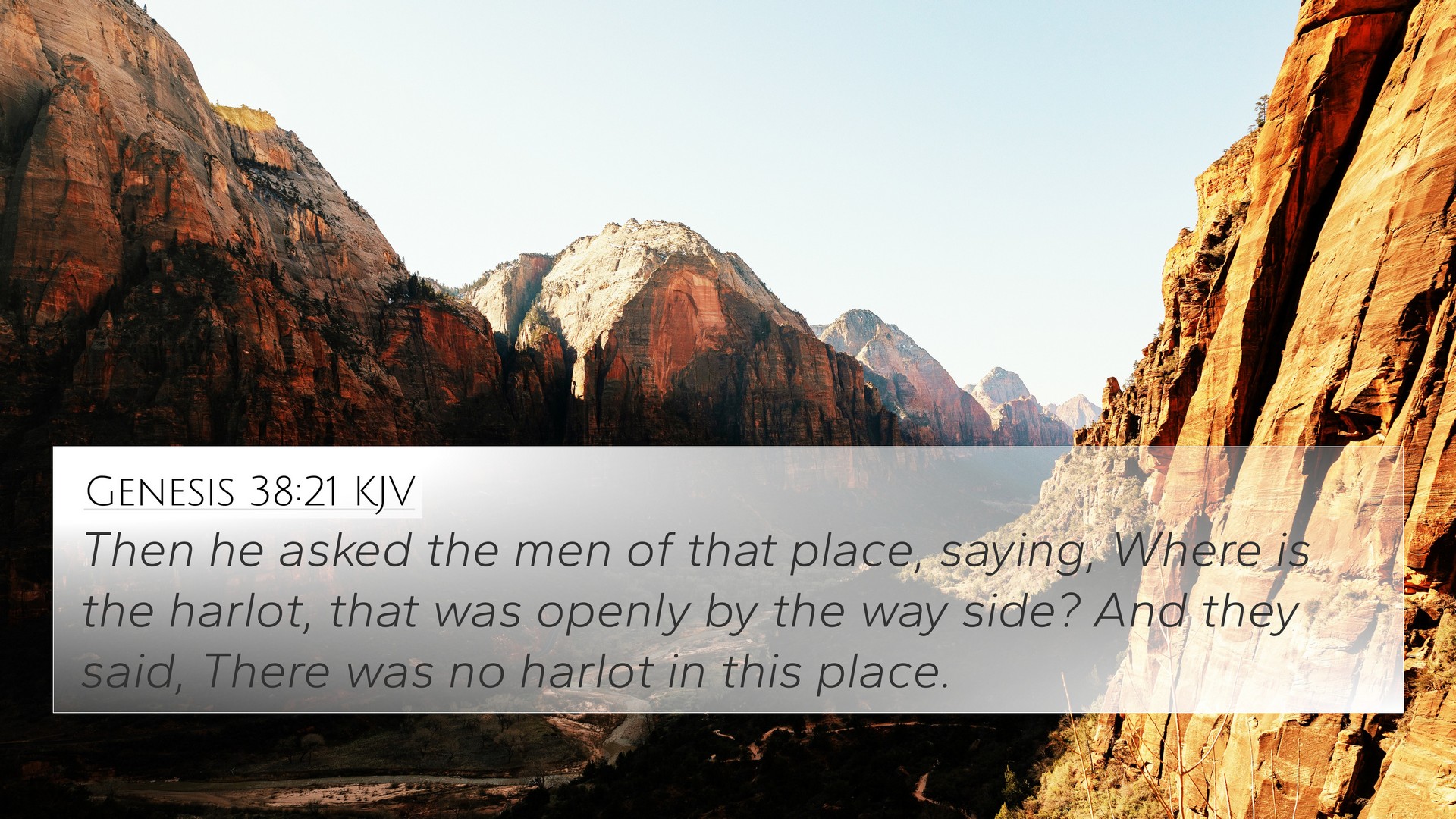Understanding Genesis 38:21
Genesis 38:21: "And he asked the men of that place, saying, Where is the harlot, that was openly by the way? And they said, There was no harlot in this place."
This verse, embedded in the story of Judah and Tamar, offers profound insights into morality, justice, and divine providence. Below, we summarize interpretations from notable public domain commentaries.
Context and Background
The account of Judah and Tamar serves as a pivotal narrative within Genesis. After the sale of Joseph, the focus shifts to Judah, who has left his brothers. This chapter introduces Tamar, his daughter-in-law, and sets the stage for a story that illustrates themes of justice and redemption.
Commentary Insights
- Matthew Henry: Henry emphasizes the moral complexity of the narrative. Judah's inquiry about the harlot reflects a deeper investigation of his own actions and the ethical dilemmas he faces. The absence of a harlot as stated by the locals points to a potential misunderstanding or deception in the community.
- Albert Barnes: Barnes interprets this verse in light of Judah's character. His casual relation to harlotry is indicative of a culture steeped in improper sexual conduct. The inquiry reveals Judah's willingness to seek out sin, but the local reply signifies a lack of acceptance and possibly a communal moral standard that shuns such behavior.
- Adam Clarke: Clarke notes the symbolic significance of the harlot's absence. The lack of a harlot may suggest a broader commentary on guilt and shame, positioning Judah’s actions against a backdrop of social accountability. This hints at God's oversight and judgment even when human affairs seem chaotic.
Thematic Connections
The themes present in Genesis 38:21 resonate with several other scripture passages, demonstrating the interconnectedness of biblical narratives. Here are some prominent cross-references:
- Leviticus 19:29: "Do not profane your daughter by making her a prostitute, so that the land will not become dissolute and full of wickedness." - This verse warns against sexual immorality, reflecting the moral implications of Judah’s actions.
- Deuteronomy 23:17-18: "None of the daughters of Israel shall be a cult prostitute, nor shall any of the sons of Israel be a cult prostitute." - Highlights the prohibition of harlotry, reaffirming the moral stance of the community.
- Proverbs 7:10: "And behold, the woman meets him, dressed as a prostitute, wily of heart." - A warning against the allure of sexual temptation akin to Judah's temptation as he seeks the harlot.
- Matthew 1:3: "And Judah the father of Perez and Zerah by Tamar." - This New Testament genealogy links back to Tamar, illustrating God's redemptive plan through unexpected circumstances.
- 1 Corinthians 6:15-16: "Do you not know that your bodies are members of Christ? Shall I then take the members of Christ and make them members of a prostitute?" - This echoes the call for holiness in one’s physical actions.
- Revelation 22:15: "Outside are the dogs and sorcerers and sexually immoral and murderers and idolaters." - A lamentation on the fate of immoral individuals in the end times, similar to the fate Judah was flirting with.
- Hosea 4:14: "I will not punish your daughters when they play the whore, nor your brides when they commit adultery..." - A reflection on the societal acceptance of immorality and the consequences that follow.
Moral Reflections
Genesis 38:21 demonstrates the moral complexities of human behavior and highlights the need for community vigilance regarding ethical standards. The inquiry about the harlot functions as a mirror to Judah's conscience, challenging readers to reflect on their own values and actions.
Application for Life
Understanding the implications of this verse and its connections to other scriptures is pivotal for modern believers:
- Consider the moral lessons from Judah's actions and how they apply to today’s ethical landscape.
- Engage with cross-references as a tool for deeper biblical understanding and a more integrated faith.
- Reflect on how individual choices impact community morality and the importance of informing one’s conscience through scripture.
Conclusion
Genesis 38:21 offers a rich canvas for exploring biblical themes of morality, shame, and redemption. It serves as a reminder of the importance of adhering to a higher moral standard and self-reflection encouraged through scripture.
For those interested in studying the Bible more deeply, utilizing a Bible concordance or a Bible cross-reference guide can provide significant insight into the thematic connections among various verses. Understanding the connections between Bible verses enriches one’s involvement with the text, offering clearer interpretations and comprehensive analyses.


